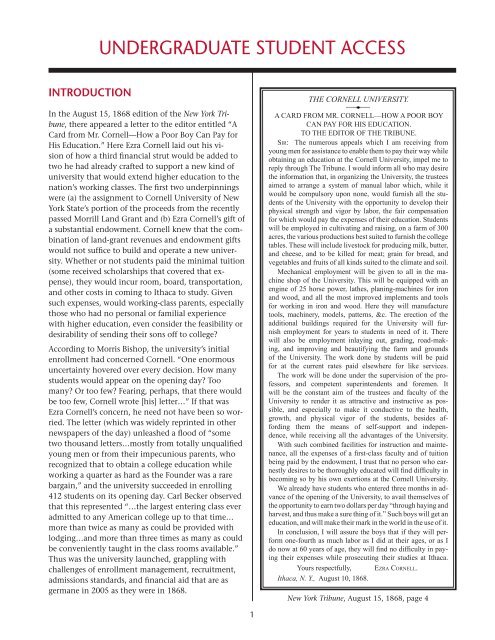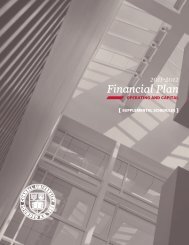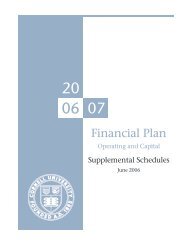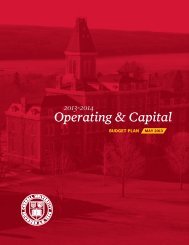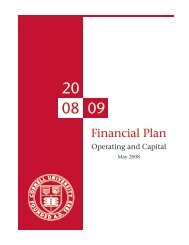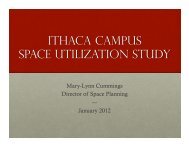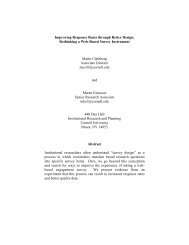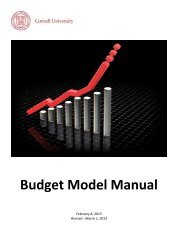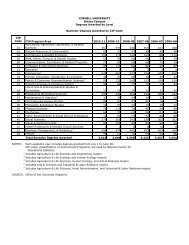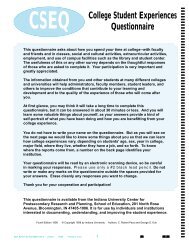Undergraduate Student Access - Cornell University Division of ...
Undergraduate Student Access - Cornell University Division of ...
Undergraduate Student Access - Cornell University Division of ...
You also want an ePaper? Increase the reach of your titles
YUMPU automatically turns print PDFs into web optimized ePapers that Google loves.
UNDERGRADUATE STUDENT ACCESSINTRODUCTIONIn the August 15, 1868 edition <strong>of</strong> the New York Tribune,there appeared a letter to the editor entitled “ACard from Mr. <strong>Cornell</strong>—How a Poor Boy Can Pay forHis Education.” Here Ezra <strong>Cornell</strong> laid out his vision<strong>of</strong> how a third financial strut would be added totwo he had already crafted to support a new kind <strong>of</strong>university that would extend higher education to thenation’s working classes. The first two underpinningswere (a) the assignment to <strong>Cornell</strong> <strong>University</strong> <strong>of</strong> NewYork State’s portion <strong>of</strong> the proceeds from the recentlypassed Morrill Land Grant and (b) Ezra <strong>Cornell</strong>’s gift <strong>of</strong>a substantial endowment. <strong>Cornell</strong> knew that the combination<strong>of</strong> land-grant revenues and endowment giftswould not suffice to build and operate a new university.Whether or not students paid the minimal tuition(some received scholarships that covered that expense),they would incur room, board, transportation,and other costs in coming to Ithaca to study. Givensuch expenses, would working-class parents, especiallythose who had no personal or familial experiencewith higher education, even consider the feasibility ordesirability <strong>of</strong> sending their sons <strong>of</strong>f to college?According to Morris Bishop, the university’s initialenrollment had concerned <strong>Cornell</strong>. “One enormousuncertainty hovered over every decision. How manystudents would appear on the opening day? Toomany? Or too few? Fearing, perhaps, that there wouldbe too few, <strong>Cornell</strong> wrote [his] letter…” If that wasEzra <strong>Cornell</strong>’s concern, he need not have been so worried.The letter (which was widely reprinted in othernewspapers <strong>of</strong> the day) unleashed a flood <strong>of</strong> “sometwo thousand letters…mostly from totally unqualifiedyoung men or from their impecunious parents, whorecognized that to obtain a college education whileworking a quarter as hard as the Founder was a rarebargain,” and the university succeeded in enrolling412 students on its opening day. Carl Becker observedthat this represented “…the largest entering class everadmitted to any American college up to that time…more than twice as many as could be provided withlodging…and more than three times as many as couldbe conveniently taught in the class rooms available.”Thus was the university launched, grappling withchallenges <strong>of</strong> enrollment management, recruitment,admissions standards, and financial aid that are asgermane in 2005 as they were in 1868.THE CORNELL UNIVERSITY.A CARD FROM MR. CORNELL—HOW A POOR BOYCAN PAY FOR HIS EDUCATION.TO THE EDITOR OF THE TRIBUNE.SIR: The numerous appeals which I am receiving fromyoung men for assistance to enable them to pay their way whileobtaining an education at the <strong>Cornell</strong> <strong>University</strong>, impel me toreply through The Tribune. I would inform all who may desirethe information that, in organizing the <strong>University</strong>, the trusteesaimed to arrange a system <strong>of</strong> manual labor which, while itwould be compulsory upon none, would furnish all the students<strong>of</strong> the <strong>University</strong> with the opportunity to develop theirphysical strength and vigor by labor, the fair compensationfor which would pay the expenses <strong>of</strong> their education. <strong>Student</strong>swill be employed in cultivating and raising, on a farm <strong>of</strong> 300acres, the various productions best suited to furnish the collegetables. These will include livestock for producing milk, butter,and cheese, and to be killed for meat; grain for bread, andvegetables and fruits <strong>of</strong> all kinds suited to the climate and soil.Mechanical employment will be given to all in the machineshop <strong>of</strong> the <strong>University</strong>. This will be equipped with anengine <strong>of</strong> 25 horse power, lathes, planing-machines for ironand wood, and all the most improved implements and toolsfor working in iron and wood. Here they will manufacturetools, machinery, models, patterns, &c. The erection <strong>of</strong> theadditional buildings required for the <strong>University</strong> will furnishemployment for years to students in need <strong>of</strong> it. Therewill also be employment inlaying out, grading, road-making,and improving and beautifying the farm and grounds<strong>of</strong> the <strong>University</strong>. The work done by students will be paidfor at the current rates paid elsewhere for like services.The work will be done under the supervision <strong>of</strong> the pr<strong>of</strong>essors,and competent superintendents and foremen. Itwill be the constant aim <strong>of</strong> the trustees and faculty <strong>of</strong> the<strong>University</strong> to render it as attractive and instructive as possible,and especially to make it conductive to the health,growth, and physical vigor <strong>of</strong> the students, besides affordingthem the means <strong>of</strong> self-support and independence,while receiving all the advantages <strong>of</strong> the <strong>University</strong>.With such combined facilities for instruction and maintenance,all the expenses <strong>of</strong> a first-class faculty and <strong>of</strong> tuitionbeing paid by the endowment, I trust that no person who earnestlydesires to be thoroughly educated will find difficulty inbecoming so by his own exertions at the <strong>Cornell</strong> <strong>University</strong>.We already have students who entered three months in advance<strong>of</strong> the opening <strong>of</strong> the <strong>University</strong>, to avail themselves <strong>of</strong>the opportunity to earn two dollars per day “through haying andharvest, and thus make a sure thing <strong>of</strong> it.” Such boys will get aneducation, and will make their mark in the world in the use <strong>of</strong> it.In conclusion, I will assure the boys that if they will performone-fourth as much labor as I did at their ages, or as Ido now at 60 years <strong>of</strong> age, they will find no difficulty in payingtheir expenses while prosecuting their studies at Ithaca.Yours respectfully, EZRA CORNELL.Ithaca, N. Y., August 10, 1868.New York Tribune, August 15, 1868, page 41


